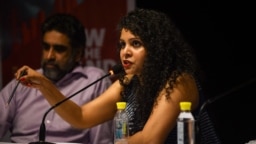April 05, 2022
Shaikh Azizur Rahman

FILE - Indian journalist and author, Rana Ayyub poses with her self published book 'Gujarat Files' during the launch event in New Delhi, May 27, 2016.
The Delhi High Court has allowed prominent Indian journalist Rana Ayyub to travel abroad, six days after she was prevented from taking a flight to Europe to speak in a series of lectures there about harassment and intimidation of journalists in the world’s largest democracy.
On Tuesday, March 29, the independent investigative journalist, who writes for The Washington Post, received an emailed summons from India’s Enforcement Directorate (ED), which investigates financial crimes, 14 minutes before her flight for London was to depart from Mumbai.
The Delhi High Court has allowed prominent Indian journalist Rana Ayyub to travel abroad, six days after she was prevented from taking a flight to Europe to speak in a series of lectures there about harassment and intimidation of journalists in the world’s largest democracy.
On Tuesday, March 29, the independent investigative journalist, who writes for The Washington Post, received an emailed summons from India’s Enforcement Directorate (ED), which investigates financial crimes, 14 minutes before her flight for London was to depart from Mumbai.

SEE ALSO:
Indian Journalist Stopped From Flying to UK, Italy to Speak About Intimidation
Known as a Look Out Circular [LOC], the summons was related to an investigation the directorate is conducting into the alleged misuse of donations that Ayyub collected for relief work during the COVID-19 pandemic.
On Monday, the court quashed the LOC, noting that it was “mala fide,” or “devoid of merits,” and infringed on the “human right [of Ayyub] to travel abroad and exercise her freedom of speech and expression.” The court has now allowed Ayyub to travel abroad on condition that she share her detailed itinerary with the ED and return to India by April 11.
Neither the EC nor the government has commented publicly on the ruling.
Ayyub is a fierce critic of Indian Prime Minister Narendra Modi, the Hindu nationalist ideology of his Bharatiya Janata Party and the activities of Hindu right-wing groups and political leaders. On social media, far-right Hindu supporters of Modi regularly abuse and threaten her for her articles highlighting the harassment and persecution of Muslims in India.
Attacks against Ayyub have escalated since the ED froze her bank accounts, accused her of laundering money and launched an investigation into the case in February.
Ayyub has denied the allegation that the ED leveled against her. She has called the actions by the agency an attempt to intimidate her.
Lawyer Vrinda Grover, who represented Ayyub in the Delhi court, said that her client was being harassed by the ED because she was a critic of the government.
After Ayyub was prevented from taking the flight last week, the London programs where she was scheduled to speak on April 1 were canceled. With the Delhi court lifting the ban on Ayyub’s travel Monday, she is scheduled to take part in an event, organized by the International Journalism Festival, in Perugia, Italy.
Ayyub is to deliver a lecture titled, “When the State Attacks: journalism under fire in the world's biggest democracy,” as the scheduled keynote speaker, on Friday, April 8.
Several participants of the festival expressed joy and relief on learning that Ayyub would be at the festival.
Julie Posetti, vice president of global research at the International Center for Journalists, or ICFJ, and an expert in online attacks against women journalists, said she is “thrilled that the New Delhi High Court has delivered justice and overruled the totally unjustified ban on Rana Ayyub's right to travel to speak at international events about press freedom erosion in India and threats to women journalists online.”
“The ban slapped on her as she attempted to board a flight to London at the invitation of ICFJ and UK-based human rights lawyers at Doughty Street Chambers was a bald and ham-fisted attempt to silence her critical journalism and commentary and crush her spirit - but it ultimately failed,” Posetti, who will be the moderator during Ayyub’s lecture at the journalism festival, told VOA.
It is essential that Ayyub be able to tell her stories and speak her truth within the international journalism community if the world is to believe that press freedom and genuine democracy have a future in India, Posetti noted.
“More power to her for confronting the Indian authorities and demanding her rights be upheld,” Posetti said.
No comments:
Post a Comment